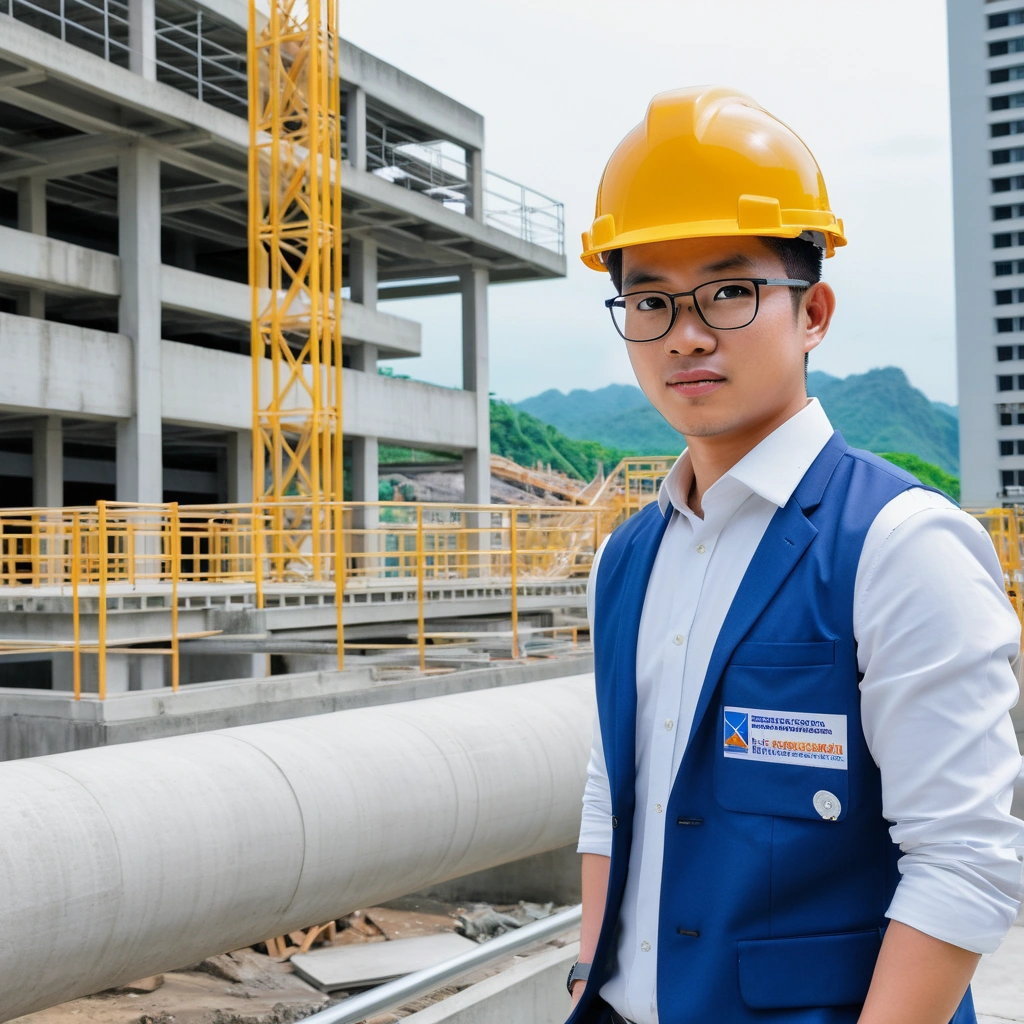From Site Supervisor to Project Leader: A Career Path for Filipino Engineers in International Construction
Introduction: The Rising Demand for Filipino Engineers
The global construction industry is experiencing unprecedented growth, particularly in Asia and the Middle East, fueled by ambitious infrastructure projects. This surge in construction activity has created a significant demand for skilled and experienced engineers, and Filipino engineers are increasingly sought after for their technical expertise, work ethic, and adaptability. From bustling metropolises to remote desert landscapes, Filipino engineers are playing a vital role in shaping the skylines and infrastructure of these regions. This article examines the career progression of Filipino engineers in international construction, focusing on the journey from site supervision roles to project leadership positions, highlighting the skills, challenges, and opportunities encountered along the way.
This demand presents significant OFW Employment Opportunities for Filipino engineers, especially given the competitive salaries and potential for career growth in international construction management. The Philippines, with its robust engineering education system and a large pool of qualified professionals, is well-positioned to meet this global need. The Philippine Regulation Commission (PRC) plays a crucial role in ensuring that Filipino engineers meet international standards through rigorous licensing exams and continuing professional development programs, making them highly attractive to employers in Asia and the Middle East.
Securing positions in these markets offers not only financial benefits but also invaluable experience in large-scale infrastructure projects, enhancing their career prospects upon return to the Philippines or further advancement abroad. For Filipino engineers seeking Career Development Opportunities, international construction offers a structured career path, typically starting with site supervision and progressing towards project leadership. Initial roles often involve overseeing daily construction activities, ensuring adherence to design specifications, and managing on-site teams. Success in these roles requires not only technical proficiency but also strong communication and problem-solving skills.
As Filipino engineers gain experience and demonstrate competence, they can advance to positions such as project engineers, construction managers, and ultimately, project leaders, taking on greater responsibilities in planning, budgeting, and overall project execution. Many companies also offer internal training programs and opportunities for further education to support the skills development of their employees, enabling them to climb the career ladder within the organization. Moreover, the international construction sector increasingly emphasizes specialized skills, creating niche opportunities for Filipino engineers.
Expertise in areas such as Building Information Modeling (BIM), sustainable construction practices, and advanced structural analysis are highly valued. Filipino engineers who invest in developing these skills can significantly enhance their career prospects and command higher salaries. Furthermore, experience in international construction projects provides invaluable exposure to diverse cultures, management styles, and construction techniques, broadening their professional horizons and making them more adaptable and versatile engineers. This exposure, coupled with continuous skills development, positions Filipino engineers as highly sought-after professionals in the global construction market.
Common Career Trajectories: From Site to Leadership
The typical career trajectory for a Filipino engineer in international construction often begins with a role as a site supervisor or field engineer. These initial positions provide invaluable hands-on experience in overseeing construction activities, ensuring quality control, and coordinating with various stakeholders. Required skills at this stage include a strong understanding of engineering principles, proficiency in construction techniques, and the ability to interpret blueprints and technical drawings. Common promotions from site supervisor include roles such as project engineer, construction manager, and eventually, project leader or project manager.
Each step up the ladder requires a broader skill set, including project planning, budgeting, risk management, and leadership abilities. Furthermore, familiarity with Building Information Modeling (BIM) and other advanced technologies is becoming increasingly important for career advancement. Navigating the path from site supervisor to project leader also necessitates a commitment to continuous learning and professional development. Many engineers pursue advanced degrees or certifications in project management to enhance their qualifications and increase their competitiveness in the international job market.
For Filipino engineers seeking OFW Employment Opportunities in the booming construction sectors of Asia and the Middle East, site supervision serves as an ideal entry point. These roles, frequently available in large-scale infrastructure projects, allow engineers to apply their technical knowledge while gaining practical experience in international construction standards and practices. For instance, a civil engineer might start as a site supervisor on a highway project in the Middle East, overseeing the paving and bridge construction phases.
This hands-on experience is crucial for understanding the complexities of construction management in diverse environments. Moreover, excelling in site supervision often leads to opportunities to work on increasingly complex and high-profile projects, accelerating career growth. Beyond technical expertise, career development for Filipino engineers in international construction hinges on acquiring crucial soft skills and certifications. Project leadership requires excellent communication, negotiation, and team management abilities. Filipino engineers should actively seek opportunities to develop these skills through workshops, training programs, and on-the-job experiences.
Furthermore, obtaining certifications such as Project Management Professional (PMP) or certifications related to specific construction technologies (e.g., LEED for sustainable construction) can significantly enhance their career prospects. Given the PRC policies regarding continuing professional development, Filipino engineers should proactively engage in relevant training to maintain their licenses and demonstrate their commitment to staying current with industry best practices. Many companies operating in international construction also offer internal training programs specifically designed to cultivate project leadership skills among their engineers.
Understanding the nuances of construction management in an international context is also paramount. This includes familiarity with different building codes, regulatory requirements, and cultural considerations. For example, construction projects in some Asian countries may require adherence to specific Feng Shui principles or local customs. Filipino engineers who demonstrate cultural sensitivity and adaptability are highly valued by international employers. Furthermore, networking with other professionals in the construction industry, both Filipino and international, can provide valuable insights and opportunities for career advancement. Platforms like LinkedIn and professional organizations offer avenues for connecting with industry leaders and learning about emerging trends in international construction.
Case Studies: Success Stories in International Construction
Several Filipino engineers have successfully transitioned to project leadership roles in major international construction projects, demonstrating the vast career development opportunities available to OFWs in this sector. One compelling example is Engr. Maria Santos, who began her career as a site engineer on a high-rise building project in Dubai. Her trajectory exemplifies the potential for advancement within international construction. Through dedicated hard work and a proactive approach to skills development, she quickly rose through the ranks, demonstrating exceptional construction management acumen and leadership qualities.
Engr. Santos is now a Project Manager for a multi-billion-dollar infrastructure project in Saudi Arabia, overseeing the construction of a new airport terminal. Her success story underscores the importance of a strong technical foundation, effective communication skills within diverse teams, and an unwavering commitment to delivering projects on time and within budget – all highly valued attributes in the Asia and Middle East construction markets. Her journey is a beacon for other Filipino engineers seeking to elevate their career path.
Another inspiring case study is that of Engr. Benigno Aquino, who started as a field engineer on a bridge construction project in Malaysia. He faced significant challenges, including navigating cultural differences and language barriers inherent in OFW employment opportunities. However, Engr. Aquino persevered, proactively adapting to the local environment and embracing continuous learning. He is now a Project Leader for a major railway project in Singapore, responsible for coordinating the efforts of engineers, contractors, and government agencies.
His experience vividly illustrates the critical role of cultural sensitivity, adaptability, and strong interpersonal skills in achieving success in international construction projects. Furthermore, his story highlights the importance of understanding local regulations and customs, crucial for Filipino engineers working abroad. The success of Filipino engineers in international construction is also bolstered by the Philippines’ commitment to high educational standards and professional licensing. PRC policies ensure that Filipino engineers possess the necessary qualifications and ethical standards to excel in their fields.
Moreover, many OFWs actively seek opportunities for further education and certifications to enhance their skills and stay competitive. The demand for skilled Filipino engineers continues to rise, particularly in infrastructure projects across Asia and the Middle East. These case studies serve as powerful testaments to the potential for career advancement and project leadership that awaits Filipino engineers in the global construction industry, provided they possess the right skills, attitude, and determination. This reinforces the significance of continuous skills development for OFWs aiming for leadership roles.
Skills and Qualifications: The Path to Advancement
Advancement in international construction demands a carefully cultivated blend of technical prowess and refined soft skills, a crucial understanding for Filipino engineers seeking to elevate their career path. Technically, proficiency extends beyond fundamental engineering principles to encompass specialized areas such as Building Information Modeling (BIM), advanced structural analysis techniques, and a comprehensive understanding of geotechnical engineering principles. Expertise in project planning software, such as Primavera P6 and MS Project, is not merely advantageous but often a prerequisite for managing complex infrastructure projects in Asia and the Middle East.
Mastering these technical skills provides a solid foundation upon which Filipino engineers can build their careers in construction management and compete effectively in the global market. However, technical expertise alone is insufficient to reach project leadership roles. Soft skills are equally, if not more, critical for success in international construction. Strong communication skills are vital for effectively coordinating with diverse teams comprising individuals from various cultural backgrounds and professional disciplines. Leadership skills are essential for motivating and guiding project teams towards achieving project goals, often under tight deadlines and challenging conditions.
Problem-solving skills are indispensable for addressing unexpected challenges that inevitably arise during construction, requiring quick thinking and decisive action. Adaptability and cultural sensitivity are crucial for navigating the complexities of working in different cultural environments, fostering collaboration, and building strong working relationships. These skills are especially important for OFWs who need to integrate into new environments and work effectively with diverse teams. To further enhance their career prospects, Filipino engineers should proactively pursue continuous skills development and professional certifications.
Understanding and adhering to PRC policies on professional licensing is paramount for maintaining professional standing and credibility. Courses and certifications in project management (e.g., PMP, PRINCE2), BIM, and sustainable construction can significantly enhance career prospects and demonstrate a commitment to professional growth. Many universities and professional organizations offer online and in-person training programs tailored to the specific needs of construction professionals. Additionally, pursuing advanced degrees, such as a Master’s in Construction Management or Engineering Management, can provide a competitive edge in the international job market and open doors to more senior roles in international construction. These efforts demonstrate a commitment to excellence and position Filipino engineers for greater success in their chosen career path, especially for those seeking opportunities in the booming construction sectors of Asia and the Middle East, where demand for skilled professionals remains high.
Challenges, Opportunities, and the Future of Project Leadership
Filipino engineers working abroad often face challenges such as cultural differences, language barriers, and the emotional toll of being away from family. As highlighted in reports concerning Filipinos jailed abroad, navigating foreign legal systems can be daunting, emphasizing the need for awareness and access to legal support. GCash simplifies remittances for Filipinos abroad, easing financial burdens and allowing them to support their families back home. However, these challenges can be overcome through proactive preparation and a positive attitude.
Opportunities for professional growth abound in international construction, particularly in regions like Asia and the Middle East, where massive infrastructure projects are constantly underway. Exposure to diverse projects, technologies, and cultures can broaden one’s skillset and significantly enhance career prospects for Filipino engineers seeking project leadership roles. Emerging trends in construction management, such as the increasing use of AI, automation, and sustainable building practices, are creating new roles and responsibilities for project leaders. To thrive in this evolving landscape, Filipino engineers must embrace lifelong learning and adapt to new technologies and methodologies.
The career path from site supervision to project leadership in international construction is challenging but rewarding, demanding continuous skills development. Proficiency in areas like BIM, advanced structural analysis, and sustainable design is increasingly important. Furthermore, understanding PRC policies related to engineering practice in different countries is crucial for compliance and career advancement. For instance, many international firms now require project managers to have experience with LEED or similar green building certifications, reflecting a global shift towards sustainable construction practices.
Filipino engineers should actively seek opportunities to gain these certifications to enhance their competitiveness in the international job market. Many professional organizations offer online courses and workshops tailored to the needs of OFWs in the construction management field, making skills development more accessible than ever. To truly excel in international construction, Filipino engineers should also focus on developing their soft skills, such as leadership, communication, and negotiation. Mentorship programs, both formal and informal, can provide invaluable guidance and support.
Consider the example of Engr. David Reyes, who credits his success as a project manager in Qatar to the mentorship he received from a senior engineer early in his career. He actively sought advice on navigating cultural differences and building strong relationships with local stakeholders. Furthermore, networking within the Filipino engineering community abroad can provide access to job opportunities, industry insights, and a sense of camaraderie. Remember the heritage and cultural touchstones of the Philippines, such as the resort in Bagac, Bataan, as a reminder of home and a source of strength during challenging times. Stay connected to your roots, support your fellow Filipinos, and never stop striving for excellence. The career path from site supervisor to project leader offers significant OFW employment opportunities and the chance to contribute to major infrastructure projects worldwide. By acquiring the necessary skills, embracing continuous learning, and overcoming obstacles, Filipino engineers can achieve remarkable success and make a lasting impact on the global construction landscape.


